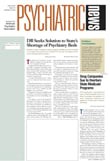Confusion in identifying a patient, operating on the wrong body or body part, bad or absent communication between different caregivers of the same patient, and medication errors are the focus of the first annual national patient safety goals, released in late July by the Joint Commission on Accreditation of Healthcare Organizations (JCAHO).
Each of the six goals carries evidence-based recommendations to help facilities reduce the specific type of error covered by the goal. To put teeth in the initiative, the JCAHO will evaluate accredited facilities for compliance with the recommendations beginning in January 2003.
“The know-how in preventing these errors exists,” Dennis O’Leary, M.D., president of the JCAHO, said in a press release. “We now need to focus on making sure that health care organizations are actually taking these preventive steps.”
The new goals call for the use of two means to identify a patient other than the standard name and room number (for inpatients) in an effort to reduce misidentification of patients and pathology samples, such as blood or tissues, going to a lab.
Prior to beginning any invasive procedure, teams will be required to conduct a “final verification process such as a timeout” to verify the identity of the patient, procedure, and site. The final verification must use active communication techniques between two or more team members, rather than one team member simply looking at a patient ID band, for example. In addition, operative teams are encouraged to mark the body part physically, in collaboration with the patient, to be operated on.
To improve the effectiveness of communication between the members of a health care team, all verbal and telephone orders will require a verification through a “read-back” of the complete order by the person receiving the order to the person who gave the order. In addition, the goals call for standardization in abbreviations, acronyms, and symbols used by organizations, including a list of each of the three that should not be used.
Concerning medication errors, the JCAHO is hoping to improve the use of “high-alert” medications, such as concentrated electrolytes and drugs that have multiple concentrations that can be confusing. The JCAHO recommends that these medications should be removed from patient care areas and dispensed directly from pharmacy stocks to avoid errors.
The 2003 goals were developed by an expert advisory panel that included physicians, risk managers, and nurses and other allied health professionals. The panel identified 25 issues, 11 of which appear as this year’s recommendations, while the remainder will be added to annual lists in subsequent years.
More information on the JCAHO’s patient safety goals is posted on the Web at www.jcaho.org/news+room/press+kits/npsg.htm. ▪
